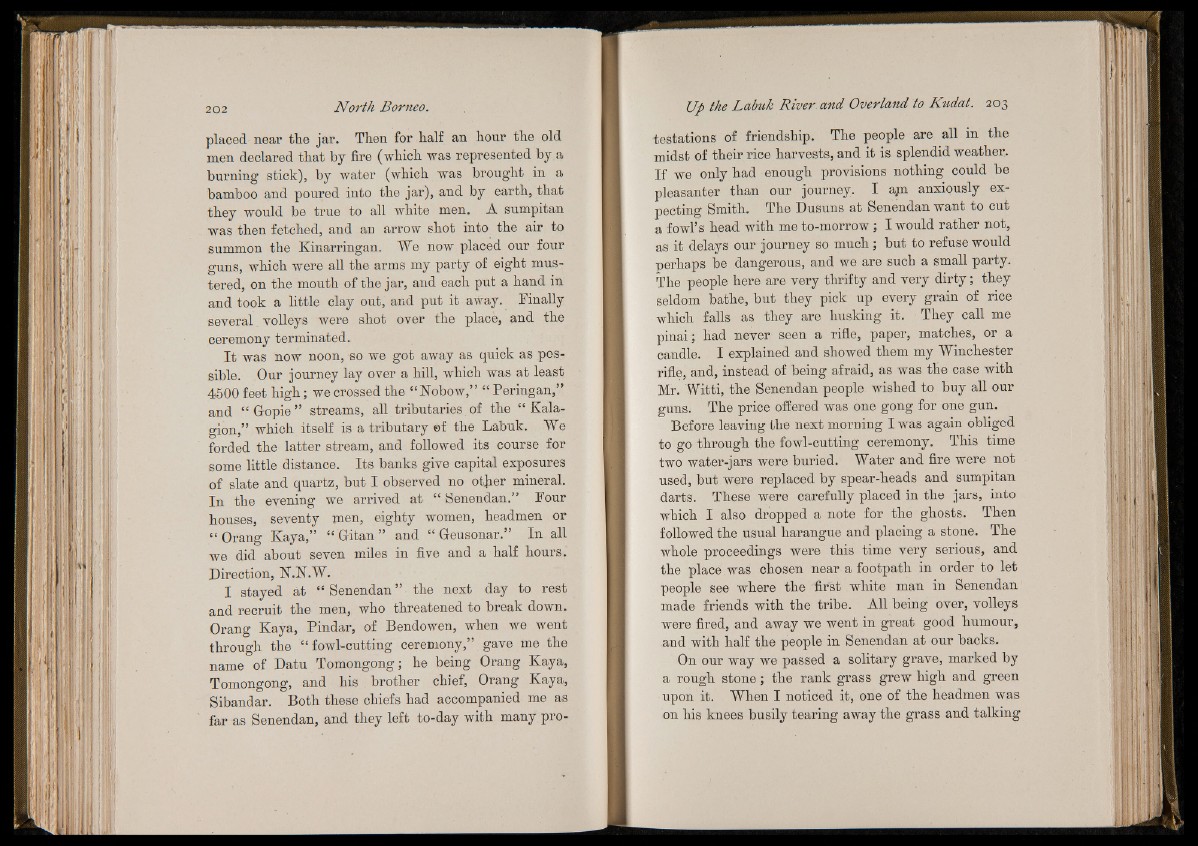
placed near the jar. Then for half an hour the old
men declared that by fire (which was represented by a
burning stick), by water (which was brought in a
bamboo and poured into the jar), and by earth, that
they would be true to all white men. A sumpitan
was then fetched, and an arrow shot into the air to
summon the Kinarringan. We now placed our four
guns, which were all the arms my party of eight mustered,
on the mouth of the jar, and each put a hand in
and took a little clay out, and put it away. Finally
several volleys were shot over the place, and the
ceremony terminated.
I t was now noon, so we got away as quick as possible.
Our journey lay over a hill, which was at least
4500 feet h ig h ; we crossed the “ Nobow,” “ Peringan,”
and “ Gropie” streams, all tributaries of the “ Kala-
gion,” which itself is a tributary ©f the Labuk. We
forded the latter stream, and followed its course for
some little distance. Its banks give capital exposures
of slate and quartz, but I observed no otjier mineral.
In the evening we arrived at “ Senendan.” Four
houses, seventy men, eighty women, headmen or
“ Orang Kaya,” “ Gritan ” and “ Greusonar. In all
we did about seven miles in five and a half hours.
Direction, N.N.W.
I stayed at “ Senendan ” the next day to rest
and recruit the men, who threatened to break down.
Orang Kaya, Pindar, of Bendowen, when we went
through the “ fowl-cutting ceremony,” gave me the
name of Datu Tomongong; he being Orang Kaya,
Tomongong, and his brother chief, Orang Kaya,
Sibandar. Both these chiefs had accompanied me as
far as Senendan, and they left to-day with many protestations
of friendship. The people are all in the
midst of their rice harvests, and it is splendid weather.
If we only had enough provisions nothing could be
pleasanter than our journey. I ajn anxiously expecting
Smith. The Dusuns at Senendan want to cut
a fowl’s head with me to-morrow ; I would rather not,
as it delays our journey so much ; but to refuse would
perhaps be dangerous, and we are sucb a small party.
The people here are very thrifty and very d irty ; they
seldom bathe, but they pick up every grain of rice
which falls as they are husking it. They call me
pinai; had never seen a rifle, paper, matches, or a
candle. I explained and showed them my Winchester
rifle, and, instead of being afraid, as was the case with
Mr. Witti, the Senendan people wished to buy all our
guns. The price offered was one gong for one gun.
Before leaving the next morning I was again obliged
to go through the fowl-cutting ceremony. This time
two water-jars were buried. Water and fire were not
used, but were replaced by spear-heads and sumpitan
darts. These were carefully placed in the jars, into
which I also dropped a note for the ghosts. Then
followed the usual harangue and placing a stone. The
whole proceedings were this time very serious, and
the place was chosen near a footpath in order to let
people see where the first white man in Senendan
made friends with the tribe. All being over, volleys
were fired, and away we went in great good humour,
and with half the people in Senendan at our backs.
On our way we passed a solitary grave, marked by
a rough sto n e ; the rank grass grew high and green
upon it. When I noticed it, one of the headmen was
on his knees busily tearing away the grass and talking